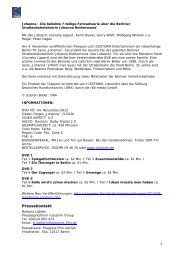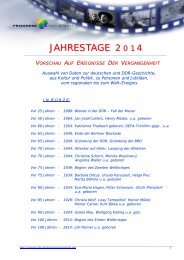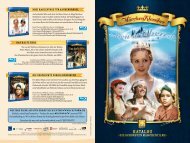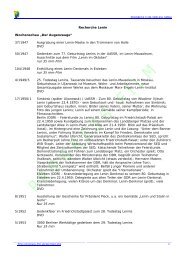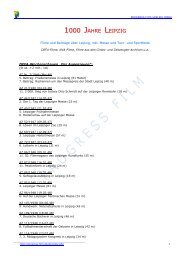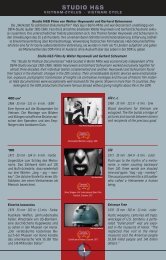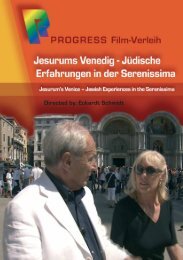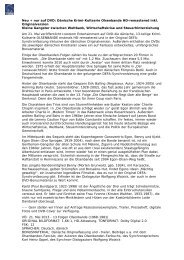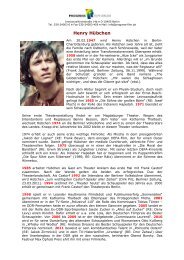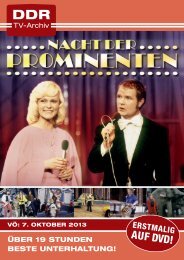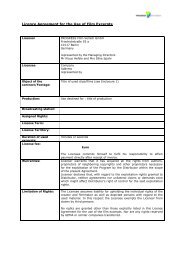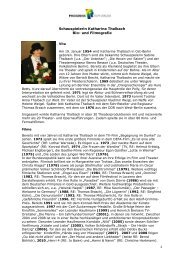Jugend-Zeit ...zu zweit - PROGRESS Film-Verleih
Jugend-Zeit ...zu zweit - PROGRESS Film-Verleih
Jugend-Zeit ...zu zweit - PROGRESS Film-Verleih
Erfolgreiche ePaper selbst erstellen
Machen Sie aus Ihren PDF Publikationen ein blätterbares Flipbook mit unserer einzigartigen Google optimierten e-Paper Software.
<strong>Jugend</strong>-<strong>Zeit</strong>/ <strong>Jugend</strong>-<strong>Zeit</strong> ...in der Stadt/<br />
<strong>Jugend</strong>-<strong>Zeit</strong> ...<strong>zu</strong> <strong>zweit</strong><br />
Produktion · Production<br />
Länge · Length<br />
Spieldauer · Running time<br />
Format<br />
Regie · Directed by<br />
Drehbuch · Screenplay by<br />
Dramaturgie · Scenario<br />
Kamera · Director of Photography<br />
Musik · Music by<br />
The Younger Days<br />
The Younger Days …In The City<br />
The Younger Days ...Together<br />
DEFA-Studio für Dokumentarfilme, 1978-1981<br />
DEFA Studio For Documentary <strong>Film</strong>s, 1978-1981<br />
497/ 465/ 550 m<br />
17 bis 19 min<br />
normal, S/W; standard, B/W<br />
Roland Steiner<br />
Roland Steiner, Gerta Stecher, Hans Leupold<br />
Karin Mosch (<strong>Jugend</strong>zeit <strong>zu</strong> <strong>zweit</strong>)<br />
Hans Leupold<br />
Stefan Diestelmann (<strong>Jugend</strong>zeit <strong>zu</strong> <strong>zweit</strong>)<br />
info@progress-film.de · Fon (+49) -30 - 24 00 30 · Fax (+49) -30 - 24 00 34 59 · www.progress-film.de
<strong>Jugend</strong>-<strong>Zeit</strong>/ <strong>Jugend</strong>-<strong>Zeit</strong> ...in der Stadt/ <strong>Jugend</strong>-<strong>Zeit</strong> ...<strong>zu</strong> <strong>zweit</strong><br />
The Younger Days/ The Younger Days …In The City/ The Younger Days ...Together<br />
INHALT · STORYLINE<br />
Es gibt eine deutsche Nachkriegsgeneration, deren Biografien<br />
von Brüchen geprägt ist, die mitten im Leben das<br />
Ende und den Neubeginn ihres Landes gestalten musste.<br />
Diese Generation wurde in der DDR, kurz vor oder kurz<br />
nach dem Mauerbau geboren, sie stand vor den großen<br />
Entscheidungen ihres Lebens, als Roland Steiner sie<br />
befragte. Steiner wurde bekannt durch seine weder wertenden<br />
noch suggestiven Fragen. Einfach, direkt und<br />
offen geht er in den drei kurzen Dokumentationen den<br />
Vorstellungen von der Zukunft, den Wünschen und<br />
Erwartungen bei der Berufs- und Partnerwahl nach.<br />
Uns begegnen Menschen, die von einem Land, das es nicht<br />
mehr gibt, geprägt wurden und die darum heute vermutlich<br />
völlig anders leben, als sie es in den Interviews mit<br />
Roland Steiner ausmalen. Diese <strong>Film</strong>e können eine Antwort<br />
auf Fragen geben, die heute in Deutschland oft<br />
gestellt werden. Fragen, von den Jungen heute, aber<br />
auch von jenen, die ihre <strong>Jugend</strong> so ganz anders erlebten,<br />
nicht auf dem Land, nicht in der Nähe eines VEB, nicht<br />
in der DDR.<br />
Einmalige, unverstellte <strong>Zeit</strong>zeugnisse, die <strong>zu</strong>m Verstehen<br />
der Gegenwart beitragen.<br />
There is a German generation after the WWII, who lived<br />
through the end and the new beginning of their country<br />
right in the middle of their lives. This is the GDR generation<br />
that was born shortly before or shortly after the<br />
building of the wall. They had the major decisions of<br />
their lives still ahead of them when Roland Steiner came<br />
to ask them. Steiner made himself known as the documentaries<br />
filmer who never asked suggestive or judging<br />
questions. In a plain style he uncovers in three documentaries<br />
their ideas of the future, the wishes and<br />
expectations for career and personal life.<br />
We meet people from a country that does not longer<br />
exist and who, probably would have answered quite differently<br />
if asked today. These films can answer many of<br />
the questions posed in Germany today; Questions of<br />
young people and of all those who did not spent their<br />
youth next to a VEB, in the countryside, not in the GDR.<br />
These films are a singular document, a witness to a period<br />
and thus help to understand the present time.<br />
REGISSEUR-BIOGRAPHIE · DIRECTOR’S BIOGRAPHY<br />
Roland Steiner, geb. am 5. Oktober 1949 in Altenburg; 1968/69<br />
Kameraassistent im DEFA-Studio für Wochenschau und Dokumentarfilme;<br />
1970-1974 Regie-Studium an der Hochschule für <strong>Film</strong> und<br />
Fernsehen in Potsdam-Babelsberg, anschließend zwei Jahre Meisterschüler,<br />
u. a. bei Heiner Carow; 1977-1991 Regisseur im DEFA-Studio<br />
für Dokumentarfilme; 1991-1993 Leiter der Fachrichtung Regie an der<br />
Hochschule für <strong>Film</strong> und Fernsehen in Potsdam-Babelsberg; seit 1995<br />
an der Oldenburger Universität „Carl von Ossietzky“ Leiter der Journalistischen<br />
Fortbildung Campus Radio<br />
<strong>Film</strong>e (Auswahl): „Großstadtkinder“ (1977); „<strong>Film</strong> von gestern“ (1979);<br />
„Unterwegs <strong>zu</strong>r Erde“ (1980); „Geheimnisse Südböhmens“ (1981);<br />
„Groß-Stadttiere - ein <strong>Film</strong> für Kinder und Erwachsene“ (1982); „Woran<br />
wir uns erinnern...“ (1984); „Was wir Leben nennen“ (1986); „Heinrich<br />
Hannover – Rechtsanwalt“ (1986); „<strong>Zeit</strong>-Raum - 46 ha Urwald in<br />
Böhmen“ (1987); „Alias Günter Wallraff“ (1987); „Die ganze Welt soll<br />
bleiben. Erich Fried. Ein Porträt“ (1988); „Unsere Kinder“ (1989); „La<br />
Rotonda Vicenza“ (1990); „Wolf Kaiser, Schauspieler: Berlin Friedrichstr.“<br />
(1992); „Was bleibt ... eine Erinnerung an Erich Fried“ (1995)<br />
Roland Steiner was born on October 5th, 1949 in Altenburg. 1968/69<br />
he was a camera assistant at the DEFA Studio For Documentary <strong>Film</strong>s.<br />
From 1970 to 1974 he studied direction at the <strong>Film</strong> University in Potsdam/<br />
Babelsberg, after that he made two master years with Heinrich<br />
Carow and others. From 1977 to 1991 he was a director at the DEFA<br />
studio for documentaries. From 1991 to 1993 he was head of direction<br />
studies at the <strong>Film</strong> University in Potsdam/Babelsberg. Since 1995,<br />
head of the journalist studies of “Campus Radio” at the University of<br />
Oldenburg “Carl-von-Ossietzky”<br />
<strong>Film</strong>s (excerpt): “Big Town Kids“ (1977); “A <strong>Film</strong> made Yesterday”<br />
(1979); “On the Way to the Earth” (1980); “South Bohemian Secrets”<br />
(1981); “Big Town Animals” (1982); “What We Remember …” (1984);<br />
“What We Call Life” (1986); “Time-Space – 46 Hectares Of Jungle In<br />
Bohemia” (1987); “Alias Günter Wallraff” (1987); “The Whole World<br />
Should Remain. Erich Fried – A Portrait” (1988); “Our Children” (1989);<br />
“Was bleibt … eine Erinnerung an Erich Fried” (1995)<br />
PRESSESTIMMEN · PRESS COMMENTS<br />
„Die <strong>Film</strong>e halten <strong>Zeit</strong>spuren fest, erörtern Lebensprobleme, fragmentarisch,<br />
punktuell. Steiner will keine Abgeschlossenheit, was sich bei<br />
der Kürze ohnehin verbietet.“<br />
(Eduard Schreiber in: Schwarzweiß und Farbe. Berlin, 1996)<br />
„Drei blutjunge Ehepaare werden nach den Wünschen und Werten in<br />
ihrem künftigen Leben befragt. Ihre Antworten vermitteln viel vom<br />
Lebensgefühl und von Lebenshaltungen unseres Heute. Steiner verzichtet<br />
wie bereits in den beiden ,<strong>Jugend</strong>-<strong>Zeit</strong>'-<strong>Film</strong>en über Heranwachsende<br />
auf dem Land und in der Stadt – auf einen verallgemeinernden<br />
Kommentar. Seine überlegten, feinfühligen Fragen führen <strong>zu</strong><br />
Entgegnungen, die wiederum den Zuschauer, und nicht nur den jungen<br />
herausfordern.“<br />
(Hans-Dieter Tok, Wochenpost, 25.08.1981)<br />
“These films freeze time, discuss life’s big questions in a fragmentary<br />
way, on the spot. Steiner does not search for closure that would be<br />
impossible anyway considering the length of the films.”<br />
(Eduard Schreiber in: Schwarzweiß und Farbe. Berlin, 1996)<br />
”Three very young couples are interviewed about their wishes and<br />
values for the future. Their answers transmit a lot about the feeling<br />
and life outlook of today. Steiner abstains himself – as he already did<br />
in the first two ‘The Younger Days’ films, about young people growing<br />
in the city and the countryside – from general comments. His<br />
thoughtful questions and the reactions hereto are a challenge to the<br />
viewer, and not only the young ones.”<br />
(Hans-Dieter Tok, Wochenpost, 25.08.1981)



